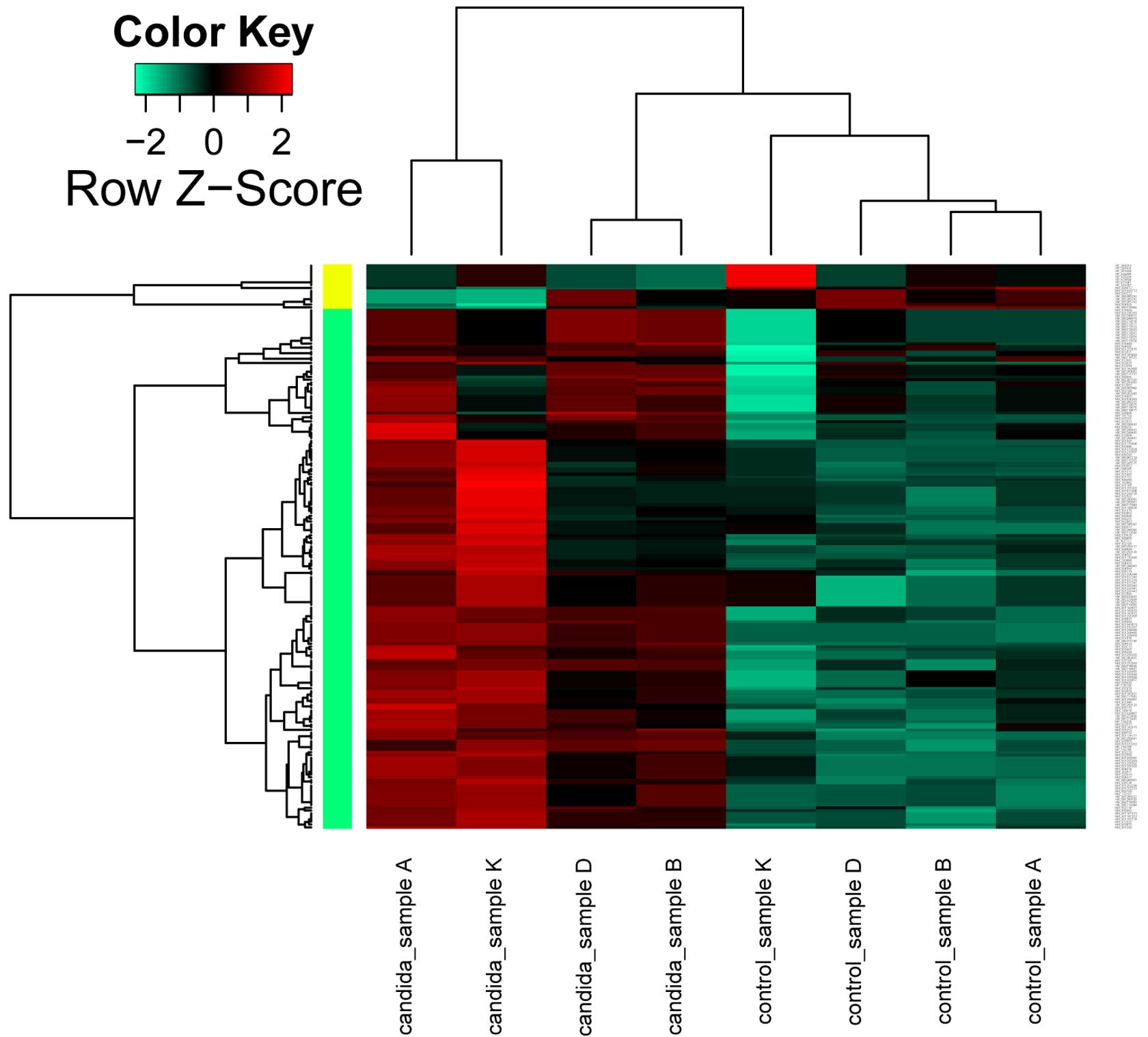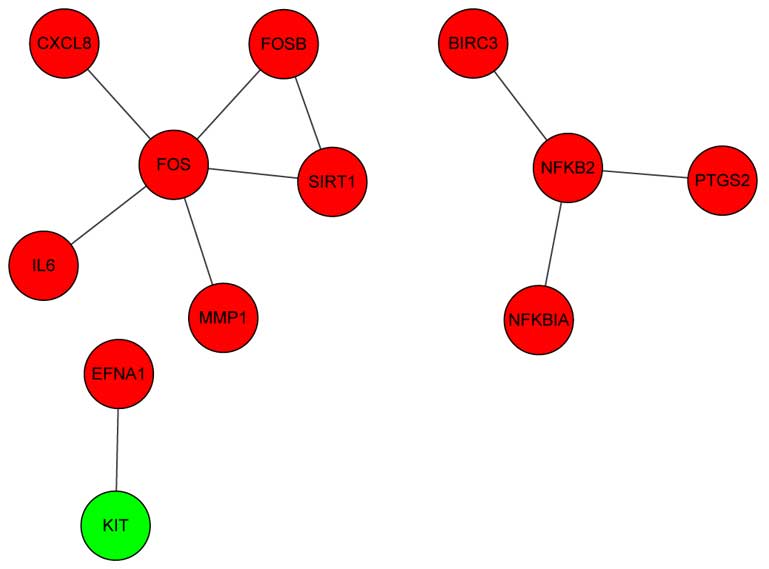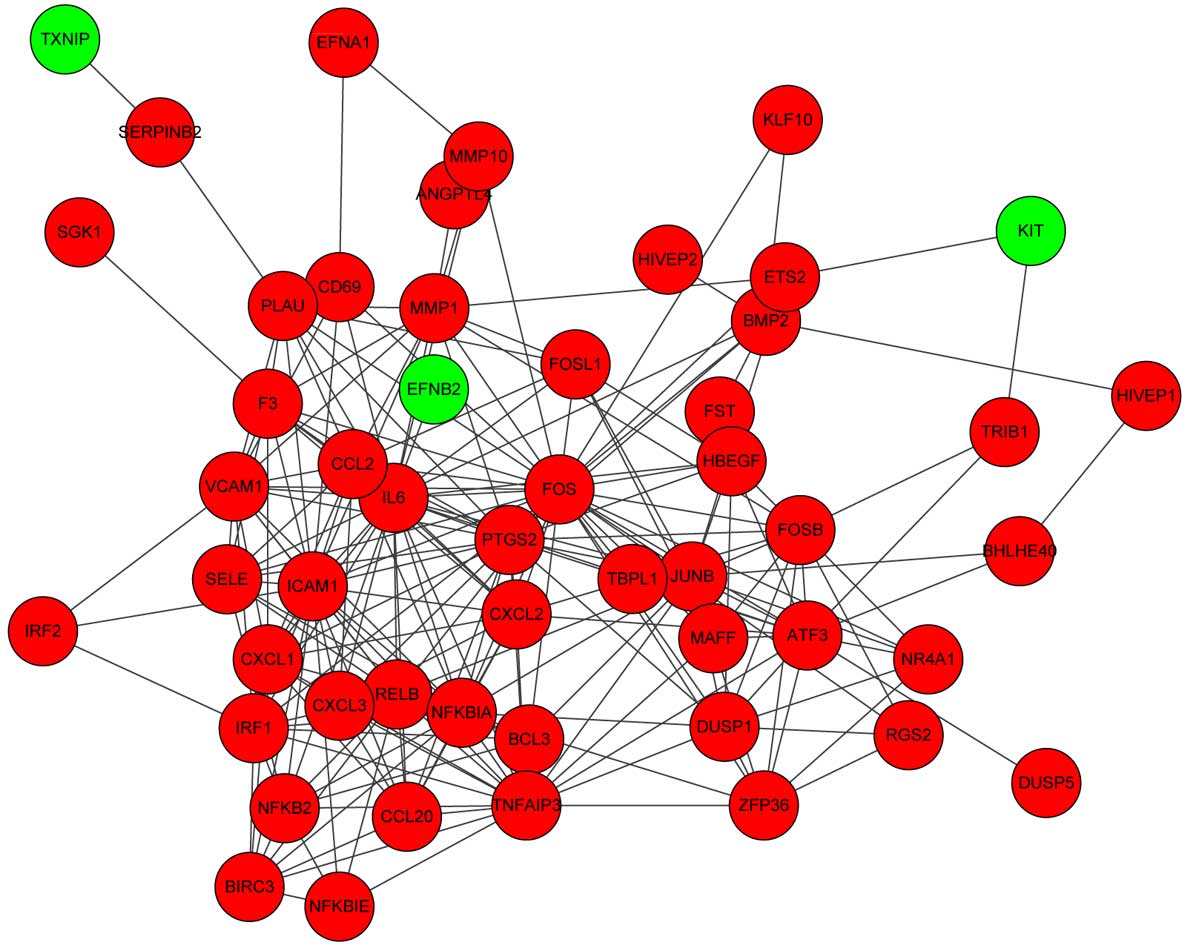|
1
|
Wisplinghoff H, Bischoff T, Tallent SM,
Seifert H, Wenzel RP and Edmond MB: Nosocomial bloodstream
infections in US hospitals: Analysis of 24, 179 cases from a
prospective nationwide surveillance study. Clin Infect Dis.
39:309–317. 2004. View
Article : Google Scholar : PubMed/NCBI
|
|
2
|
Alby K, Schaefer D and Bennett RJ:
Homothallic and heterothallic mating in the opportunistic pathogen
Candida albicans. Nature. 460:890–893. 2009. View Article : Google Scholar : PubMed/NCBI
|
|
3
|
Gudlaugsson O, Gillespie S, Lee K, Vande
Berg J, Hu J, Messer S, Herwaldt L, Pfaller M and Diekema D:
Attributable mortality of nosocomial candidemia, revisited. Clin
Infect Dis. 37:1172–1177. 2003. View
Article : Google Scholar : PubMed/NCBI
|
|
4
|
Stevens DA: Combination immunotherapy and
antifungal chemotherapy. Clin Infect Dis. 26:1266–1269. 1998.
View Article : Google Scholar : PubMed/NCBI
|
|
5
|
Sun JN, Solis NV, Phan QT, Bajwa JS,
Kashleva H, Thompson A, Liu Y, Dongari-Bagtzoglou A, Edgerton M and
Filler SG: Host cell invasion and virulence mediated by Candida
albicans Ssa1. PLoS Pathog. 6:e10011812010. View Article : Google Scholar : PubMed/NCBI
|
|
6
|
Orozco AS, Zhou X and Filler SG:
Mechanisms of the proinflammatory response of endothelial cells to
Candida albicans infection. Infect Immun. 68:1134–1141.
2000. View Article : Google Scholar : PubMed/NCBI
|
|
7
|
Müller V, Viemann D, Schmidt M, Endres N,
Ludwig S, Leverkus M, Roth J and Goebeler M: Candida
albicans triggers activation of distinct signaling pathways to
establish a proinflammatory gene expression program in primary
human endothelial cells. J Immunol. 179:8435–8445. 2007. View Article : Google Scholar : PubMed/NCBI
|
|
8
|
Moyes DL, Runglall M, Murciano C, Shen C,
Nayar D, Thavaraj S, Kohli A, Islam A, Mora-Montes H, Challacombe
SJ and Naglik JR: A biphasic innate immune MAPK response
discriminates between the yeast and hyphal forms of Candida
albicans in epithelial cells. Cell Host Microbe. 8:225–235.
2010. View Article : Google Scholar : PubMed/NCBI
|
|
9
|
Jayatilake J, Samaranayake L, Lu Q and Jin
L: IL-1alpha, IL-1ra and IL-8 are differentially induced by
Candida in experimental oral candidiasis. Oral Dis.
13:426–433. 2007. View Article : Google Scholar : PubMed/NCBI
|
|
10
|
Moyes DL, Murciano C, Runglall M, Kohli A,
Islam A and Naglik JR: Activation of MAPK/c-Fos induced responses
in oral epithelial cells is specific to Candida albicans and
Candida dubliniensis hyphae. Med Microbiol Immunol.
201:93–101. 2012. View Article : Google Scholar : PubMed/NCBI
|
|
11
|
Sørlie T, Perou CM, Tibshirani R, Aas T,
Johnsen H, Hastie T, Eisen MB, van de Rijn M, Jeffrey SS, Thorsen
T, et al: Gene expression patterns of breast carcinomas distinguish
tumor subclasses with clinical implications. Proc Natl Acad Sci
USA. 98:10869–10874. 2001. View Article : Google Scholar : PubMed/NCBI
|
|
12
|
Beer DG, Kardia SL, Huang CC, Giordano TJ,
Levin AM, Misek DE, Lin L, Chen G, Gharib TG, Thomas DG, et al:
Gene-expression profiles predict survival of patients with lung
adenocarcinoma. Nat Med. 8:816–824. 2002.PubMed/NCBI
|
|
13
|
Gautier L, Cope L, Bolstad BM and Irizarry
RA: Affy-analysis of Affymetrix GeneChip data at the probe level.
Bioinformatics. 20:307–315. 2004. View Article : Google Scholar : PubMed/NCBI
|
|
14
|
Ritchie ME, Phipson B, Wu D, Hu Y, Law CW,
Shi W and Smyth GK: Limma powers differential expression analyses
for RNA-sequencing and microarray studies. Nucleic Acids Res.
43:e472015. View Article : Google Scholar : PubMed/NCBI
|
|
15
|
Ashburner M, Ball CA, Blake JA, Botstein
D, Butler H, Cherry JM, Davis AP, Dolinski K, Dwight SS, Eppig JT,
et al: Gene ontology: Tool for the unification of biology. Nat
Genet. 25:25–29. 2000. View
Article : Google Scholar : PubMed/NCBI
|
|
16
|
Kanehisa M and Goto S: KEGG: Kyoto
encyclopedia of genes and genomes. Nucleic Acids Res. 28:27–30.
2000. View Article : Google Scholar : PubMed/NCBI
|
|
17
|
Franceschini A, Szklarczyk D, Frankild S,
Kuhn M, Simonovic M, Roth A, Lin J, Minguez P, Bork P, von Mering C
and Jensen LJ: STRING v9.1: Protein-protein interaction networks,
with increased coverage and integration. Nucleic Acids Res.
41D808–D815. (Database Issue)2013. View Article : Google Scholar : PubMed/NCBI
|
|
18
|
Smoot ME, Ono K, Ruscheinski J, Wang PL
and Ideker T: Cytoscape 2.8: New features for data integration and
network visualization. Bioinformatics. 27:431–432. 2011. View Article : Google Scholar : PubMed/NCBI
|
|
19
|
Takeda K, Kaisho T and Akira S: Toll-like
receptors. Ann Rev Immunol. 21:335–376. 2003. View Article : Google Scholar
|
|
20
|
Gantner BN, Simmons RM, Canavera SJ, Akira
S and Underhill DM: Collaborative induction of inflammatory
responses by dectin-1 and Toll-like receptor 2. J Exp Med.
197:1107–1117. 2003. View Article : Google Scholar : PubMed/NCBI
|
|
21
|
Netea MG, Van der Graaf CA, Vonk AG,
Verschueren I, Van der Meer JW and Kullberg BJ: The role of
toll-like receptor (TLR) 2 and TLR4 in the host defense against
disseminated candidiasis. J Infect Dis. 185:1483–1489. 2002.
View Article : Google Scholar : PubMed/NCBI
|
|
22
|
Zakikhany K, Naglik JR, Schmidt-Westhausen
A, Holland G, Schaller M and Hube B: In vivo transcript profiling
of Candida albicans identifies a gene essential for
interepithelial dissemination. Cell Microbiol. 9:2938–2954. 2007.
View Article : Google Scholar : PubMed/NCBI
|
|
23
|
Weindl G, Naglik JR, Kaesler S, Biedermann
T, Hube B, Korting HC and Schaller M: Human epithelial cells
establish direct antifungal defense through TLR4-mediated
signaling. J Clin Invest. 117:3664–3672. 2007.PubMed/NCBI
|
|
24
|
Gow NA and Hube B: Importance of the
Candida albicans cell wall during commensalism and
infection. Curr Opin Microbiol. 15:406–412. 2012. View Article : Google Scholar : PubMed/NCBI
|
|
25
|
Moyes DL, Murciano C, Runglall M, Islam A,
Thavaraj S and Naglik JR: Candida albicans yeast and hyphae
are discriminated by MAPK signaling in vaginal epithelial cells.
PLoS One. 6:e265802011. View Article : Google Scholar : PubMed/NCBI
|
|
26
|
Dongari-Bagtzoglou A and Fidel P Jr: The
host cytokine responses and protective immunity in oropharyngeal
candidiasis. J Dent Res. 84:966–977. 2005. View Article : Google Scholar : PubMed/NCBI
|
|
27
|
Mostefaoui Y, Bart C, Frenette M and
Rouabhia M: Candida albicans and Streptococcus
salivarius modulate IL-6, IL-8 and TNF-alpha expression and
secretion by engineered human oral mucosa cells. Cell Microbiol.
6:1085–1096. 2004. View Article : Google Scholar : PubMed/NCBI
|
|
28
|
Kempe S, Kestler H, Lasar A and Wirth T:
NF-κB controls the global pro-inflammatory response in endothelial
cells: evidence for the regulation of a pro-atherogenic program.
Nucleic Acids Res. 33:5308–5319. 2005. View Article : Google Scholar : PubMed/NCBI
|
|
29
|
de Herrero Dios C, Román E, Monge RA and
Pla J: The role of MAPK signal transduction pathways in the
response to oxidative stress in the fungal pathogen Candida
albicans: implications in virulence. Curr Protein Pept Sci.
11:693–703. 2010. View Article : Google Scholar : PubMed/NCBI
|
|
30
|
Vallabhapurapu S and Karin M: Regulation
and function of NF-κB transcription factors in the immune system.
Annu Rev Immunol. 27:693–733. 2009. View Article : Google Scholar : PubMed/NCBI
|
|
31
|
Yumoto H, Nakae H, Fujinaka K, Ebisu S and
Matsuo T: Interleukin-6 (IL-6) and IL-8 are induced in human oral
epithelial cells in response to exposure to periodontopathic
Eikenella corrodens. Infect Immun. 67:384–394.
1999.PubMed/NCBI
|

















